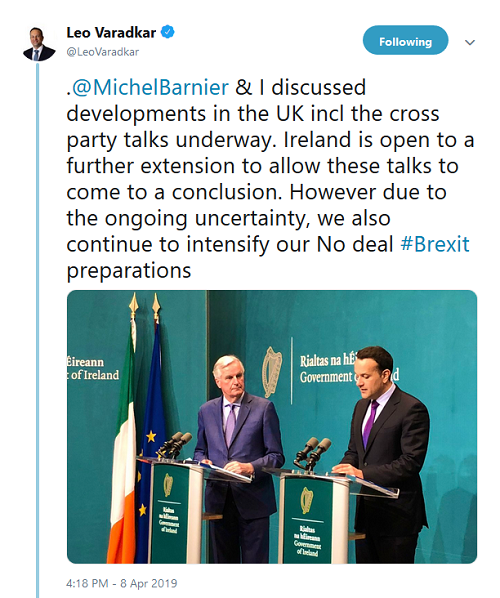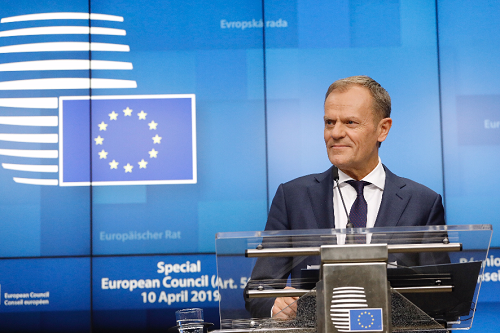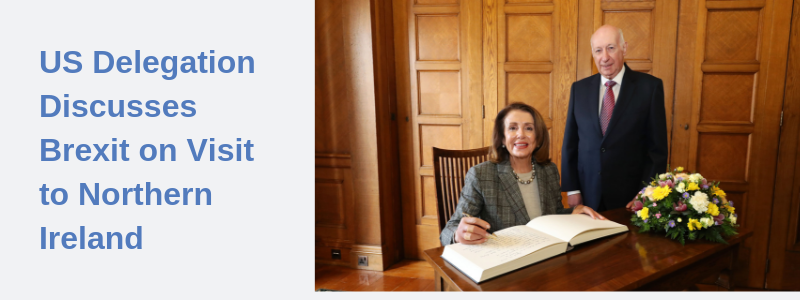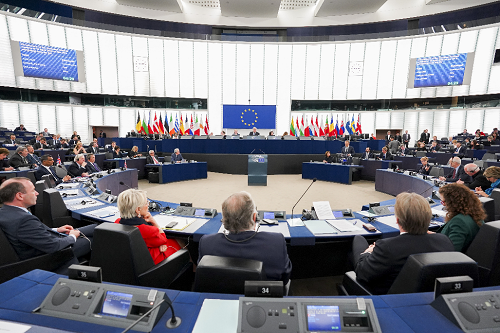Brexit Brief Newsletter
April 2019

This month’s issue covers the main Brexit news of April 2019 including the Prime Minister’s request for an extension to Article 50. We also have an update on the Scottish ‘Continuity Bill’; details of the launch of the Brexit Party and the latest news from the Interparliamentary Forum on Brexit.
UPDATE ON THE SCOTTISH CONTINUITY BILL

On 5 April 2019, the Scottish Government Constitutional Relations Secretary Michael Russell wrote to the Presiding Officer of the Scottish Parliament Ken Macintosh to advise that, following cross-party talks on the implications of the Supreme Court’s judgement on the legislation, the Scottish Government has ‘reluctantly’ decided not to move for reconsideration of the Continuity Bill.
The UK Withdrawal from the European Union (Legal Continuity) (Scotland) Bill – the so-called Continuity Bill - provided for matters devolved to Scotland and currently governed by EU law to be repatriated to the Scottish Parliament upon the UK’s exit from the EU. The Bill was introduced as the Scottish Parliament refused to give legislative consent to the EU (Withdrawal) Act 2018 which was introduced by the UK Government to manage the repatriation of powers from the EU.
In his statement, Michael Russell says “.….. the Scottish Government will ensure the choices made by the Scottish Parliament are respected by:
- bringing forward new legislation to ensure Scots law continues to align with EU law
- strengthening environmental protection, including seeking opportunities to legislate
- looking at how best to safeguard important EU human rights values
- agreeing new protocols with the Scottish Parliament, which are now in place, to give MSPs more scrutiny over Brexit legislation”
BREXIT NEGOTIATOR VISITS DUBLIN
The EU’s chief Brexit negotiator Michel Barnier met with Taoiseach Leo Varadkar in Dublin on 8 April. Speaking following the meeting Mr Barnier said the bloc wouldn’t start trade talks with the U.K. in the event of a no-deal Brexit until an agreement was reached on the Irish border.

COOPER-LETWIN BILL RECEIVES ROYAL ASSENT

The European Union (Withdrawal) (No. 5) Bill completed its passage through the House of Lords on 8 April 2019. The Bill received Royal Assent on the same day and is now law – the European Union (Withdrawal) Act 2019. As reported previously, the legislation created a mechanism whereby the House of Commons can instruct the Prime Minister to ask the European Council for an extension to Article 50 in the absence of an approval resolution for an exit deal from the EU.
PM MEETS EU LEADERS
On 9 April, the Prime Minister held talks with German Chancellor Angela Merkel and French President Emmanuel Macron as part of her drive to secure the short extension to Article 50 she has requested.
EU COUNCIL MEETING TO DISCUSS FURTHER EXTENSION TO ARTICLE 50

The leaders of the EU27 met on 10 April 2019 to discuss the Prime Minister’s request for an Article 50 extension. Shortly before the start of the main summit meeting, leaders from countries most affected by the UK’s exit from the EU held a ‘coordination’ meeting.
The PM requested an extension to 30 June however it was reported that Council President Donald Tusk would prefer a year-long extension to avoid a rolling set of extensions. There is also a question on whether the UK could have an early exit from whatever extension period is agreed in the event of agreement in Westminster.
A year-long extension would require the UK to participate in the European elections in May 2019.
The Council agreed to a further extension to allow for ratification of the Withdrawal Agreement by both the UK and the EU. The Council’s decision states “….Such an extension should last as long as necessary and, in any event, no longer than 31 October 2019…. the Withdrawal Agreement may enter into force on an earlier date, should the Parties complete their respective ratification procedures before31 October 2019. Consequently, the withdrawal should take place on the first day of the month following the completion of the ratification procedures or on 1 November 2019, whichever is the earliest.
The statement also includes “This extension excludes any re-opening of the Withdrawal Agreement. Any unilateral commitment, statement or other act by the United Kingdom should be compatible with the letter and the spirit of the Withdrawal Agreement, and must not hamper its implementation. Such an extension cannot be used to start negotiations on the future relationship.
The Council agreed to review progress at its June 2019 meeting.
Following the Council meeting, President Donald Tusk said “Tonight the European Council decided to grant the United Kingdom a flexible extension of the Article 50 period until the 31st of October. This means an additional 6 months for the UK. During this time, the course of action will be entirely in the UK's hands. It can still ratify the Withdrawal Agreement, in which case the extension will be terminated. It can also reconsider the whole Brexit strategy. That might lead to changes in the Political Declaration, but not in the Withdrawal Agreement. Until the end of this period, the UK will also have the possibility to revoke Article 50 and cancel Brexit altogether.
The UK will continue its sincere cooperation as a full member state with all its rights, and as a close friend and trusted ally in the future.
Let me finish with a message to our British friends: this extension is as flexible as I expected, and a little bit shorter than I expected, but it's still enough to find the best possible solution. Please do not waste this time.”
In her statement to the House of Commons on 11 April on the European Council meeting, the Prime Minister Theresa May said “…. The choices we face are stark and the timetable is clear. I believe we must now press on at pace with our efforts to reach a consensus on a deal that is in the national interest. I welcome the discussions that have taken place with the Opposition in recent days and the further talks that are resuming today. …..
I hope that we can reach an agreement on a single unified approach that we can put to the House for approval, but if we cannot do so soon, we will seek to agree a small number of options for the future relationship that we will put to the House in a series of votes to determine which course to pursue. As I have made clear before, the Government stand ready to abide by the decision of the House, but to make this process work, the Opposition would need to agree to this, too.
With the House’s consent, we could also bring forward the withdrawal agreement Bill, which is a necessary element of any deal, whichever course we take. The Bill will take time to pass through both Houses, so if we want to get on with leaving, we need to start this process soon. It could also provide a useful forum to resolve some of the outstanding issues in the future relationship …..”
On the topic of a customs union, the Prime Minister said “…. I think that there is more agreement in relation to a customs union than is often given credit when different language is used. We have been clear that we want to obtain the benefits of a customs union—no tariffs, no rules of origin checks and no quotas, while being able to operate our own independent trade policy. The Labour party has said that it wants a say in trade policy. The question is how we can provide for this country to be in charge of its trade policy in the future.”
BREXIT PARTY OFFICIAL LAUNCH

Nigel Farage officially launched the Brexit Party on 12 April in Coventry. Six of the party’s candidates for the European Parliament elections were announced at the launch – Annunziata Rees-Mogg, Ben Habib, June Mummery, Dr Alka Sehgal Cuthburt, Richard Tice, and party leader Nigel Farage.
Speaking at the launch Mr Farage said "This party is not here just to fight the European elections... this party is not just to express our anger - 23 May is the first step of the Brexit Party. We will change politics for good."
He also said “I said that if I ever did come back into the political fray, next time it would be no more Mr Nice Guy, and I mean it. I am angry about what has happened. I said many years ago I wanted to cause an earthquake in British politics. Now what I am fighting for, and with your support what we will attempt to achieve, is a democratic revolution in British politics.”
Three UKIP MEPs have defected to the new party. West Midlands MEP Jill Seymour, North Lincolnshire MEP Jane Collins and East Midlands MEP Margot Parker announced their resignations from UKIP on 15 April.
Ann Widdecombe, the former Conservative shadow home secretary announced on 24 April that she will stand as a candidate for the Brexit Party.
US DELEGATION DISCUSSES BREXIT ON VISIT TO NORTHERN IRELAND

A delegation from the US Congress visited Northern Ireland as part of an itinerary which also included visits to Stuttgart, London and Dublin.
The delegation included the Chairman of the House Ways and Means Committee Richard Neal and other committee members as well as Speaker of the House Nancy Pelosi.
In her statement on 12 April announcing the visit, Speaker Pelosi said “Led by Ways & Means Committee Chairman Richard Neal, our delegation is strengthened by Members with deep expertise and years of leadership on the U.S.-Ireland alliance and Northern Ireland. We will meet with senior government officials and local leaders to learn more about the future of the UK and Ireland amid Brexit and to express America’s enduring commitment to a peaceful and prosperous future for all who live there.”
“The United Kingdom and Ireland each have a deep and special bond with the United States,” said Speaker Pelosi. “Our distinguished delegation is traveling at a critical moment for two of our closest allies, and we look forward to high-level discussions about the path forward on our shared security and economic interests.”
The delegation visited the Northern Ireland Assembly on 19 April 2019.
BREXIT TALKS CONTINUE BETWEEN THE GOVERNMENT AND LABOUR
On 15 April a Downing Street spokesperson confirmed that the continuing talks between the Government and the Labour party on Brexit are structured in three themed working groups – workers’ rights and services; environmental issues; and security.
Reports suggest that the Government has set an informal deadline of 7 or 8 May for the cross party talks to make significant progress or move to a conclusion.
The talks are expected to culminate with a formal meeting of senior cabinet ministers on Tuesday or Wednesday, though sources on both sides said no new offer had been made yet by the Government. There is speculation that one area of focus is on reaching agreement on the future of customs arrangements.
The Labour Party’s National Executive Council has agreed that it would support a second Brexit referendum only as a last result. In a statement on 1 May, the party said that the policy is to demand the government adopt Labour’s plan for a post-Brexit customs union with the EU, or to hold a general election. Only if these options fail will Labour support a referendum. The meeting was held to sign off on the party’s manifesto for the European Parliamentary election on 23 May.
DONALD TUSK ADDRESSES EUROPEAN PARLIAMENT

Speaking to the European Parliament on 16 April, Council President Donald Tusk said “I know that, on both sides of the Channel, everyone, including myself, is exhausted with Brexit, which is completely understandable. However, this is not an excuse to say: "let's get it over with", just because we're tired. We must continue to deal with Brexit with an open mind, and in a civilised manner. Because whatever happens, we are bound by common fate, and we want to remain friends and close partners in the future.
During the European Council one of the leaders warned us not to be dreamers, and that we shouldn't think that Brexit could be reversed. I didn't respond at the time, but today, in front of you, I would like to say: at this rather difficult moment in our history, we need dreamers and dreams. We cannot give in to fatalism. At least I will not stop dreaming about a better and united Europe.”
WITHDRAWAL AGREEMENT BILL
At the Cabinet meeting on 23 April, the introduction of the Withdrawal Agreement Bill was discussed with the Cabinet agreeing that the Bill should be put before the House of Commons “as soon as possible,” May’s spokesman James Slack told reporters that the question was how to ensure its “safe passage.”
The Withdrawal Agreement Bill is the legislative tool to implement the provisions of the Withdrawal Agreement reached between the UK and the EU and is required under the EU (Withdrawal) Act 2018 as part of the ratification of the Agreement.
At its party conference on 29 April, the Scottish National Party confirmed that it would not support the Bill when it is introduced to the Commons.
INTERPARLIAMENTARY FORUM ON BREXIT
The seventh meeting of the Interparliamentary Forum on Brexit was held on 26 April in Edinburgh. The forum provides an opportunity for interparliamentary dialogue between legislatures within the United Kingdom, to support more effective scrutiny of Brexit related issues.
Representatives of Committees scrutinising Brexit-related issues in the Scottish Parliament, National Assembly for Wales, House of Commons and House of Lords, met to discuss and agree their response to the UK Minister for the Cabinet Office on the review of Intergovernmental relations. This letter recommends that the outcome of the review should include explicit recognition of the scrutiny role for UK and Devolved Parliaments including the timely provision of information. It also recognises the commitment of the UK Minister for the Cabinet Office to resourcing and supporting proposals jointly put forward by the UK Legislatures.
The Forum also discussed common frameworks and the role of devolved administrations in future international agreements. As part of those discussions the Forum met with Michael Russell MSP, Cabinet Secretary for Government Business and Constitutional Relations. The Forum also recommends, in its letter to the UK Minister for the Cabinet Office, that each Parliament is given sufficient time and opportunity to scrutinise and approve common frameworks.
The Forum agreed a terms of reference:
“The primary purposes of the Inter-Parliamentary Forum on Brexit is to provide a mechanism for dialogue and cooperation between parliamentarians from all the UK Parliaments on issues of common interest and concern, and to consider a number of scrutiny challenges arising from the new constitutional arrangements which will be required post-Brexit both within the UK and between the UK and the EU and beyond including –
- Confidential and non-legislative inter-governmental relations (IGR) including the JMC structures;
- Legislative and non-legislative common frameworks;
- International treaties including trade deals;
- Conferred powers on UK Ministers to legislate in non-reserved areas currently within the competence of the EU;
- Future relations with the EU and other international relations;
- Future constitutional arrangements within the UK including how non-reserved areas which are currently within the competence of the EU intersect with reserved areas.
Where appropriate and based on the work of the individual committees represented within the Forum we will aim to set out a consensual and common position of our views on each of these areas”
The agreed joint statement is available here
PRIME MINISTER QUIZZED BY COMMONS LIAISON COMMITTEE
The Prime Minister appeared before the House of Commons Liaison Committee on 1 May to answer questions on a topics including Brexit.
The session on Brexit was divided into three themes - taking stock of where we are now, the next stage of negotiations and preparations for no deal; security and border issues; and trade and the economy.
On the ongoing talks between the Government and the Opposition Theresa May said “We have been having constructive, meaningful talks which are continuing.
There are differences on issues, but on many of the key areas — particularly the withdrawal agreement — there is common ground. We know that we need to end this uncertainty and do so as soon as possible. I hope that a deal can be done — we certainly approach this with an open mind - but if we are not able to do that, we will bring votes to the House in order to determine what the House can support. We stand ready to abide by that decision if the Opposition are willing to do so.
Dr Andrew Murrision, Chair of the Commons Northern Ireland Affairs Committee asked the Prime Minister about preparations in Northern Ireland for exiting the EU. In response, the Prime Minister said “We have published our proposals for the position in relations to tariffs, if there were to be a no-deal situation, across the border between Northern Ireland and the Republic of Ireland, but those
could only be temporary and would need further negotiation with the European Commission and the Irish Government for a long-term sustainable solution. The issue that I had expressly identified - and it was identified in the House in debates around that time — in relation to Northern Ireland was the whole question of the governance arrangements for Northern Ireland in a no-deal situation in the absence of the Executive.
The concern was that decisions that would need to be made would not be able to be made simply by Northern Ireland civil servants, so alternative governance arrangements would need to be put in place. We now have an extension, and of course we also now have the situation where the Taoiseach and I last Friday called on the parties to come together for talks to re-establish the devolved Administration. The Secretary of State for Northern Ireland and the Tánaiste then set a date for talks with those parties to come together again. I hope that we are able to see the reinstatement of the Executive and the ability of the Assembly to operate in Northern Ireland, such that those governance arrangements were then in place there.”
Dr Murrison “So in the event that the talks are successful, those concerns would fall away. In the event that the talks are not successful, we would be back in the same position, would we not? That is, we would be unable to leave without a deal, except by direct rule. Is that correct?”
The Prime Minister: “Yes. Obviously, direct rule can maybe come in different gradations, but it is about ensuring that there is some form of governance, which would certainly encompass some element of direct rule, that enables the decisions that are necessary to be taken.”
Dr Murrison: “Which would inevitably mean ministerial decisions being taken here in Westminster, rather than in Belfast.”
The Prime Minister: “Yes, but, as you know, that is why I hope we will be able to see the talks actually resolving the issue and the devolved Administration in Northern Ireland being reinstated.”
EUROPEAN ELECTIONS
The 2019 European elections will take place on Thursday 23rd May.
To be able to vote in the upcoming European elections on 23rd May, all UK nationals and other EU nationals living in the UK must register by 7th May.
EU27 citizens also have to fill in an extra form and send it to their local Electoral Registration Office by 7th May 2019. Further details on the election are available here
Northern Ireland will elect 3 Members of the European Parliament (MEPs). The candidates are:
- Alliance Party - Naomi Long
- Conservatives - Amandeep Bhogal
- Democratic Unionist Party - Diane Dodds
- Green Party - Clare Bailey
- Independent - Jane Morrice
- Independent - Neil McCann
- Sinn Féin - Martina Anderson
- Social Democratic & Labour Party - Colum Eastwood
- Traditional Unionist Voice - Jim Allister
- UKIP - Robert Hill
- Ulster Unionist Party - Danny Kennedy
BREXIT LEGISLATION
As at 8 April 2019, the Government has laid 515 Statutory Instruments (SIs) before Parliament to prepare the statute book for exit day.
While many of these SIs may be technical, you can see how the debate on the draft Animal Health, Seed Potatoes and Food (Amendment) (Northern Ireland) (EU Exit) Regulations 2019 highlighted how the legislation might affect seed potato producers in Northern Ireland. For example, David Simpson, MP for Upper Bann said “…. Wilson’s Country in my constituency will lose £60,000 per week if it cannot export seed potatoes to the Republic of Ireland.” You can check out Brexit related statutory instruments relevant to Northern Ireland on the Assembly Research and Information Service tracker.
Of the 515 Brexit SIs laid before Parliament so far, 396 (76%) have completed their passage through Parliament.
The Government is introducing a suite of legislation to deal with Brexit. A summary of the status of some of this legislation is below. A full list of Bills before Parliament is available here
- Agriculture Bill – awaiting report stage in the House of Commons.
- Animal Welfare (Sentencing and recognition of sentience) Bill – not yet introduced. Consultation responses to draft Bill published August 2018
- Environment (Principles and Governance) Bill 2018 - draft clauses published 19 December 2018
- Financial Services (Implementation of Legislation) Bill (only required in the event of a no deal Brexit) – awaiting report stage in the House of Commons.
- Fisheries Bill – awaiting report stage in the House of Commons
- Immigration and Social Security Co-ordination (EU Withdrawal) Bill – awaiting report stage in the House of Commons
- Trade Bill - ‘Ping Pong’ stage where Bill will go to the Commons for consideration of Lords amendments is to be scheduled
- EU (Withdrawal Agreement) Bill – not yet introduced
Acts of Parliament (i.e. are now law)
- EU (Withdrawal) Act 2018
- Haulage Permits and Trailer Registration Act 2018
- Healthcare (European Economic Area and Switzerland Arrangements) Act 2019
- Nuclear Safeguards Act 2018
- Sanctions and Anti-Money Laundering Act 2018
- Taxation (Cross-border Trade) Act 2018
SO WHAT’S NEXT?

May 2: Local government elections in Northern Ireland and England
May 23: European Parliament elections. If the UK leaves the EU before 22 May, the elections will not be held in the UK.
June 20-21: European Council meeting
July 2: European Parliament’s first session of new term begins



